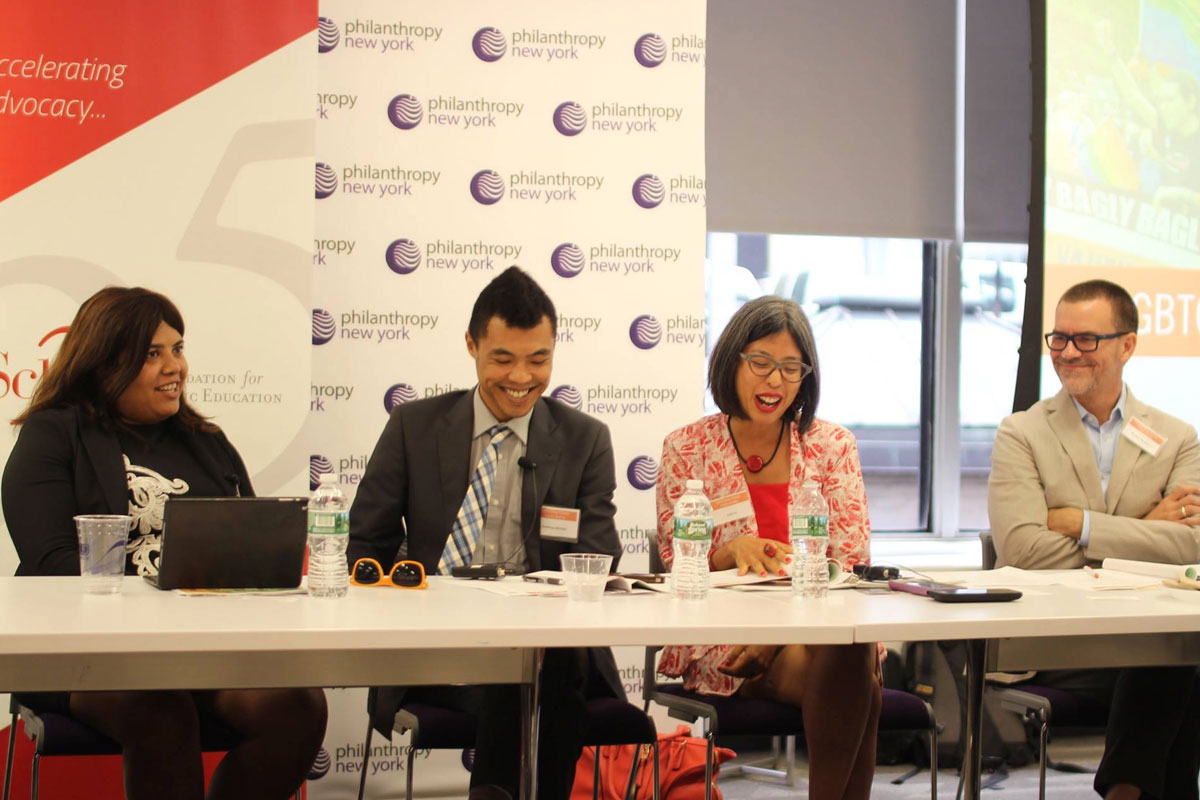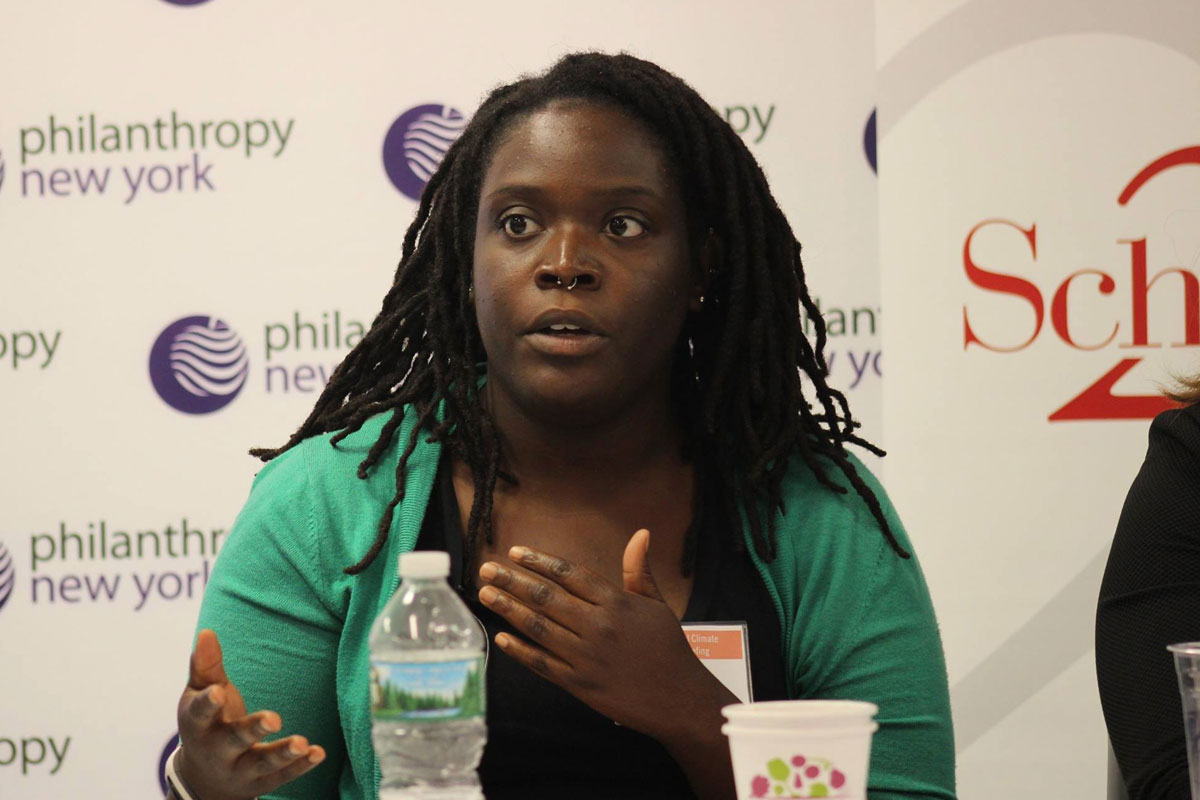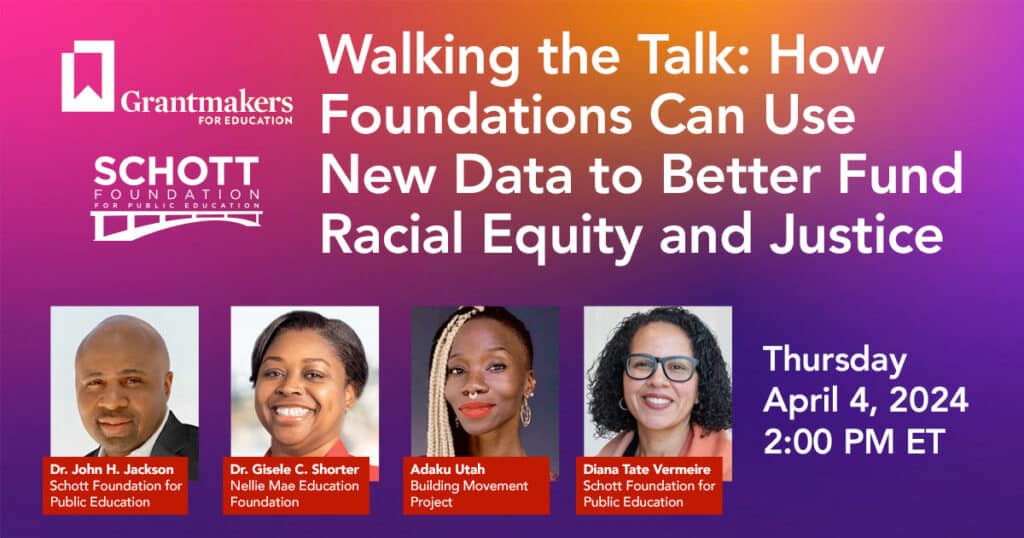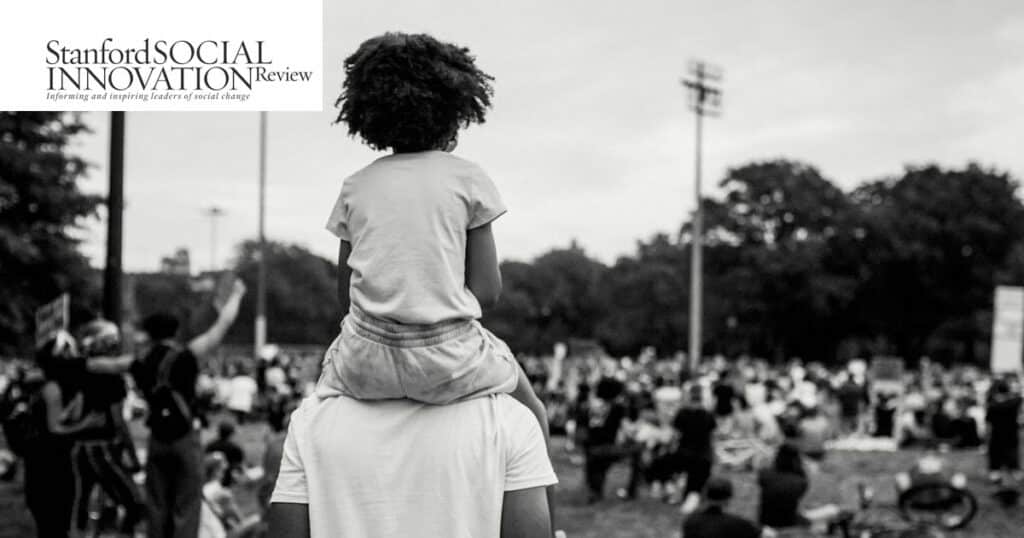Blog
Mobilizing Philanthropy to Improve School Climate for LGBTQ Youth
How can we ensure healthy school climates for LGBTQ youth, particularly youth of color in schools, in the present political environment? This was the animating question behind a wide-ranging funders briefing and strategy session held by the Schott Foundation for Public Education in partnership with Funders for LGBTQ Issues and Communities for Just Schools Fund in New York City on July 25th.
The Schott Foundation was prompted to convene funders and advocates given recent attacks on the LGBTQ communities and the resulting impacts on the most vulnerable among this community, LGBTQ youth of color and the critical need to mobilize philanthropic resources to support movement building and advocacy groups working in the education justice space.
The afternoon started with an overview of the latest research, followed by a panel of advocates to discuss the policy and advocacy landscape, exploring the gaps that need closing and the emerging opportunities to improve school climate. The day rounded out with a funder’s strategy session, discussing immediate philanthropic opportunities and on-going strategies to support the movement.
Framing the Issue

Edgar Villanueva, Schott Foundation Vice President of Programs and Advocacy
“Supporting LGBTQ youth has always been a part of Schott’s history and a part of our intersectional analysis,” said Edgar Villanueva, Schott’s Vice President of Programs and Advocacy, at the outset. “But the is a new urgency now because last November our lives changed drastically.”
Ben Francisco Maulbeck, President of Funders of LGBTQ Issues provided an overview of philanthropic support for LGBTQ issues over the years, with a particular focus on education. “We’ve seen growth in other parts of LGBTQ funding but not in education… there’s not a robust infrastructure for LGBTQ education issues at the state and local level. There are definitely organizations doing good work. There are GSAs all over the country, but beyond a few larger organizations like GSA Network and GLSEN, which are the national level, it’s not like there’s a Safe Schools Alliance with multiple staff in every state or even in a majority of states. That’s just an infrastructure context for us to be aware of as funders concerned about this issue.”
UT-Austin professor Dr. Stephen Russell provided the latest data on school climate for LGBTQ students. “Ten years ago we could not say this, but we absolutely have good research evidence for what makes a difference to grades, safety and supports for LGBTQ young people,” he said, “What we really need is the political will and the social will to make that happen.”
Dr. Russell made the important point that intersectional analysis is much better understood and widespread now than it was previously: researchers and advocates are understanding issues in terms of not just individuals, but the contexts and webs of relationships they find themselves in.
In particular the California Healthy Kids Survey has proven to be an invaluable resource for finding out what’s happening in schools across a wide range of populations. In the 2013-15 school year, the survey for the first time included a question about sexual orientation and gender identity. Based on that survey and related data sources, Russell and his team examined “the degree to which depression and victimization are precursors for these negative outcomes for kids. We basically show that in both cases, depression and victimization explain a significant part of that risk, which means that if we can move the dial, we can dramatically reduce suicide ideation and substance abuse risk if we can reduce victimization and depression in transgender kids.”
Insights from Advocates

Anurima Bhargava, Geoffrey Winder, Judy Yu, and Dr. Stephen Russell
Our panel of expert advocates was moderated by Judy Yu of Wellspring Advisors, LLC. The guest speakers included:
- Anurima Bhargava, former Chief of the Educational Opportunities Section of the Civil Rights Division at US Department of Justice
- Geoffrey Winder, Genders & Sexualities Alliance Network
- Khadija Hudson, Girls for Gender Equity
- Chase Strangio, American Civil Liberties Union
Geoffrey Winder discussed the many opportunities and challenges GSA Networks are facing across the country. For LGBTQ students in rural areas, isolation can be a significant barrier. As Winder put it, “Folks are feeling like even if they have these connections at a national level or at a regional level, they’re still one student running a GSA in the middle of a rural place and the next school and community is an hour drive away. So it’s not like you’re really building a local community or a sense of feeling like you’re a part of something larger.” Relationships between GSA chapters and the wider national LGBTQ community are more important than ever in today’s political climate
Anurima Bhargava detailed the changes, both big and small, at the Federal level over the past several months. The expected aspects of education policy at the Department of Justice have changed — litigation, advocacy, and policy — but also a reduction in the foundational respect for youth and LGBTQ youth specifically. As Bhargava put it, students “just being able to talk about the discrimination, but also the trauma, and the pain, and the grief was incredibly important, and that it happened not only from all of us who were trying to do the work of these working cases, but also all the way up to the Secretary of Education, the Attorney General, and the President.”
Bhargava also emphasized the amount of confusion that changes coming from the Departments of Justice and Education have caused at the state and local level, particularly around Title IX and guidance around transgender use of school bathrooms. She updated us on the latest litigation developments and encouraged advocates to consider what a positive legislative strategy would look like to make some advances in school climate for LGBTQ students.
As Chase Strangio put it, “The stakes feel really high, and they always have. We’re literally talking about the lives of the community members that we care about.” Strangio warned of the dangers of momentum — when one bad bill is passed in one state, that encourages legislators elsewhere to pick similar fights in their own states. He also reminded us support struggles in what many consider to be hostile states with little hope for short-term victories: “I like to think of our defensive work as affirmative, reframing it that way, and saying alright, we’re not afraid of you, we’re going to show up, we’re going to bring 200 people to testify, and this is how we’re going to change the conversation. It’s not going to be a parachute in with limited resources and just look at the moment as the testimony, but actually think about what it means to build power in a community that is coming together for this very particular thing but is going to have to keep living in this state without being able to file OCR complaints.”

Khadija Hudson
Khadija Hudson discussed the participatory action research she has been conducting with young people in New York City. Three things consistently came up as she talked with students across the city:
- A need for support and resources, including access to bathrooms and locker rooms, but also seeing queer, trans, and gender non-conforming members of staff in their school.
- A need to see themselves in school curriculum. Hudson said students would tell her “I only see black people, but it’s usually cisgender black men. I don’t see Sylvia Rivera or Marsha P. Johnson in the curriculum, or I’m not seeing Audre Lorde in the curriculum.”
- A need for respect and visibility. “I would say in every single vision session that I’ve done with young people they all ask for respect from adults in their space. Not so much peers, it was mainly adults and teachers, and how they’re constantly being misgendered, or teachers refusing to use the names that they’re asking to be referred to by.”
The conversation continued throughout the afternoon and finished with a funders-only discussion on how best to support the crucial work of improving school climate for LGBTQ youth across the country. School climate is a life-or-death issue for countless children, and funders and advocates left the event with a better understanding of both the problem and the many possible routes to ensuring that all children have the opportunity to learn they deserve.
In the near future, Schott will release a full report on the briefing including additional key recommendations for philanthropic action. We hope that you will consider partnering with the Schott Foundation in our effort to provide grants and technical assistance to grassroots organizations working to support education justice and rights LGBTQ youth.


